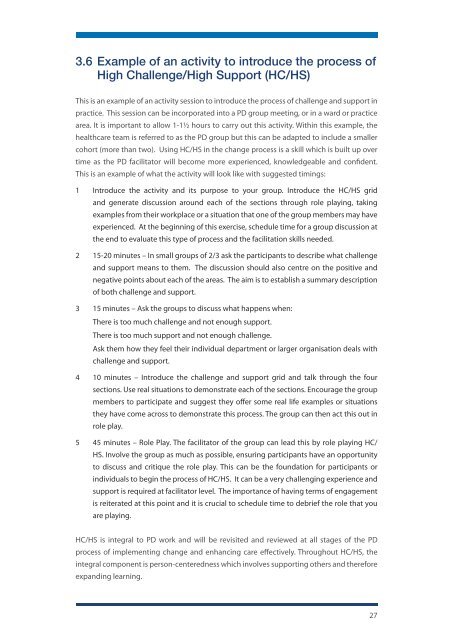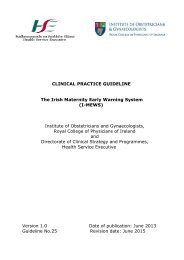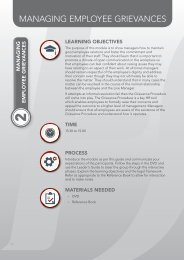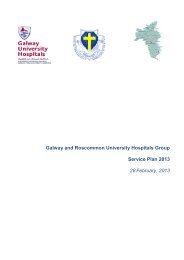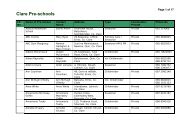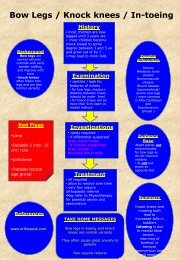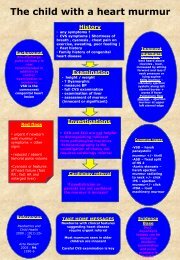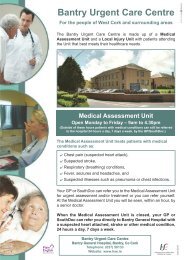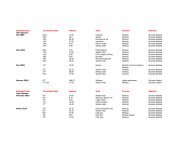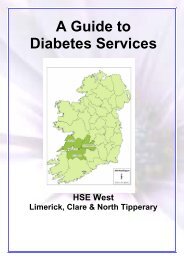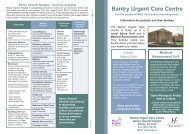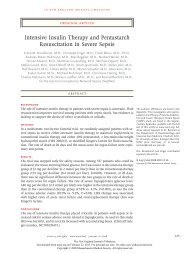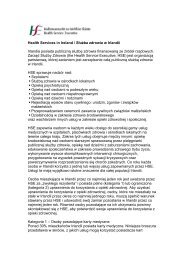Enhancing Care for Older People - Health Service Executive
Enhancing Care for Older People - Health Service Executive
Enhancing Care for Older People - Health Service Executive
Create successful ePaper yourself
Turn your PDF publications into a flip-book with our unique Google optimized e-Paper software.
3.6 Example of an activity to introduce the process of<br />
High Challenge/High Support (HC/HS)<br />
This is an example of an activity session to introduce the process of challenge and support in<br />
practice. This session can be incorporated into a PD group meeting, or in a ward or practice<br />
area. It is important to allow 1-1½ hours to carry out this activity. Within this example, the<br />
healthcare team is referred to as the PD group but this can be adapted to include a smaller<br />
cohort (more than two). Using HC/HS in the change process is a skill which is built up over<br />
time as the PD facilitator will become more experienced, knowledgeable and confident.<br />
This is an example of what the activity will look like with suggested timings:<br />
1 Introduce the activity and its purpose to your group. Introduce the HC/HS grid<br />
and generate discussion around each of the sections through role playing, taking<br />
examples from their workplace or a situation that one of the group members may have<br />
experienced. At the beginning of this exercise, schedule time <strong>for</strong> a group discussion at<br />
the end to evaluate this type of process and the facilitation skills needed.<br />
2 15-20 minutes – In small groups of 2/3 ask the participants to describe what challenge<br />
and support means to them. The discussion should also centre on the positive and<br />
negative points about each of the areas. The aim is to establish a summary description<br />
of both challenge and support.<br />
3 15 minutes – Ask the groups to discuss what happens when:<br />
There is too much challenge and not enough support.<br />
There is too much support and not enough challenge.<br />
Ask them how they feel their individual department or larger organisation deals with<br />
challenge and support.<br />
4 10 minutes – Introduce the challenge and support grid and talk through the four<br />
sections. Use real situations to demonstrate each of the sections. Encourage the group<br />
members to participate and suggest they offer some real life examples or situations<br />
they have come across to demonstrate this process. The group can then act this out in<br />
role play.<br />
5 45 minutes – Role Play. The facilitator of the group can lead this by role playing HC/<br />
HS. Involve the group as much as possible, ensuring participants have an opportunity<br />
to discuss and critique the role play. This can be the foundation <strong>for</strong> participants or<br />
individuals to begin the process of HC/HS. It can be a very challenging experience and<br />
support is required at facilitator level. The importance of having terms of engagement<br />
is reiterated at this point and it is crucial to schedule time to debrief the role that you<br />
are playing.<br />
HC/HS is integral to PD work and will be revisited and reviewed at all stages of the PD<br />
process of implementing change and enhancing care effectively. Throughout HC/HS, the<br />
integral component is person-centeredness which involves supporting others and there<strong>for</strong>e<br />
expanding learning.<br />
27


